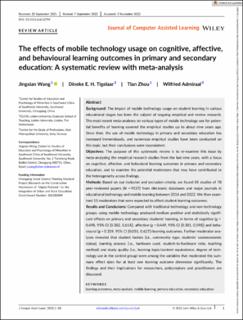| dc.description.abstract | Background: The impact of mobile technology usage on student learning in various
educational stages has been the subject of ongoing empirical and review research.
The most recent meta‐analyses on various types of mobile technology use for poten-
tial benefits of learning covered the empirical studies up to about nine years ago.
Since then, the use of mobile technology in primary and secondary education has
increased tremendously, and numerous empirical studies have been conducted on
this topic, but their conclusions were inconsistent.
Objectives: The purpose of this systematic review is to re‐examine this issue by
meta‐analyzing the empirical research studies from the last nine years, with a focus
on cognitive, affective, and behavioral learning outcomes in primary and secondary
education, and to examine the potential moderators that may have contributed to
the heterogeneity across findings.
Methods: Based on our inclusion and exclusion criteria, we found 85 studies of 78
peer‐reviewed papers (N = 9157) from electronic databases and major journals in
educational technology and mobile learning between 2014 and 2022. We then exam-
ined 15 moderators that were expected to affect student learning outcomes.
Results and Conclusions: Compared with traditional technology and non‐technology
groups, using mobile technology produced medium positive and statistically signifi-
cant effects on primary and secondary students' learning, in terms of cognitive (g =
0.498, 95% CI [0.382, 0.614]), affective (g = 0.449, 95% CI [0.301, 0.598]) and beha-
vioural (g = 0.339, 95% CI [0.051, 0.627]) learning outcomes. Further moderator ana-
lyses revealed that student factors (i.e., community type, students’ socioeconomic
status), learning process (i.e., hardware used, student‐to‐hardware ratio, teaching
method) and study quality (i.e., learning topic/content equivalence, degree of tech-
nology use in the control group) were among the variables that moderated the sum-
mary effect sizes for at least one learning outcome dimension significantly. The
findings and their implications for researchers, policymakers and practitioners are
discussed. | en_US |

